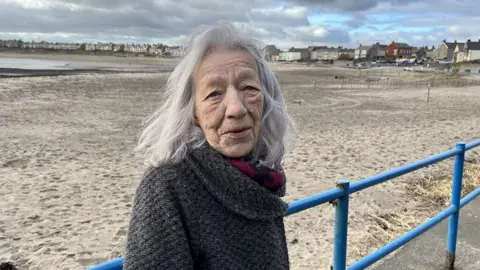Coastal areas need help to overturn inequalities, report says
 Getty Images
Getty ImagesMinisters must do more to help struggling coastal communities around England with levelling-up policies at risk of failing to turn around decades of inequality, a new report warns.
Nearly one in five jobs pay below the living wage, the study says, with household income almost £3,000 lower than in non-coastal areas.
Poorer health, education, transport and broadband links are also highlighted.
The government said it continued to provide support to coastal economies.
The report was commissioned by the Coastal Communities Alliance, the Local Government Association Coastal Special Interest Group and the Coastal Partnerships Network and the BBC has been given exclusive access to it ahead of its publication on Wednesday.
'Hidden' problems
The report - called Communities on the Edge - warns levelling up's focus on regions means "massive challenges" faced by some smaller, remote parts of the country are "hidden" and likely to be missed by the government.
It points to the East of England, which has the third-highest regional average weekly pay despite parts having some of the lowest earnings in the country.
The report says:
- Many areas have lower wages due to jobs being seasonal and part-time in the tourism sector, or with small firms.
- A lower proportion of children achieve GCSE qualifications in maths and English, with children more likely to regularly miss school.
- Fewer council houses mean people rely on private rentals where costs are higher, and cars are needed because of poor public transport.
- Coastal areas have higher rates of depression, suicide, alcohol-related hospital admissions and emergency admissions for lung conditions.
- Limited gigabit broadband and 4G provision causes a "digital divide".
It described the issues facing such areas as having been "years, if not decades" in the making.
Challenges 'entrenched'
Commenting on its findings, Sally-Ann Hart MP, chair of the All-Party Parliamentary Group for Coastal Communities, said: "The additional challenges faced by people living on the coast are so entrenched that help is needed from central government to stop them falling further behind.
"Our beautiful coastline is an incredible national asset. But it urgently needs sustainable long-term investment to make the most of the opportunities for growth - particularly in green jobs which can support the government's climate goals."

Wages are 'pretty grim'

Six miles from Land's End and home to Britain's furthest South onshore lighthouse, Pendeen in Cornwall is a community surrounded by stunning scenery. But like many coastal villages, that charm masks inequalities.
Jennifer Dines recently moved to the area and is able to take advantage of hybrid working, which means her commuting costs are lower than for some other residents.
"I'm one of the lucky ones who can work from home some days," she says.
"No-one local can afford to buy a local place. Prices aren't reflected in wages at all.
"It's pretty grim how much people earn here, trying to buy places that are ridiculous amounts of money."

What can be done?
The report calls for the government to target deprived areas by changing its levelling-up criteria and funding formulas. It also recommends helping projects financially over their full lifespan rather than for a short, defined period.
The right support, it argues, "would boost growth and see coastal areas contribute far more to the wider UK economy".
Among the key opportunities it identifies are the move to hybrid and home working which it says gives younger people the chance to remain in their local areas rather than move away to find work.
And with coastal areas already involved in industries such as offshore wind, it argues the transition to green energy could provide hundreds of thousands of highly-skilled, well-paid jobs.
Additionally, it says developing ways to extend traditional tourist seasons beyond summer months would enable areas to benefit from the current growth in UK trips and visitors.

'We've been forgotten'

Once a thriving place, Newbiggin in Northumberland was heavily affected as industries such as fishing and mining wound down.
Retired teacher Sheila Harrison said she despaired at a lack of investment and opportunities for young people.
"Over time, the fishing industry shrunk, mines closed and railways closed," she said.
"Consequently, the place just deteriorated.
"Governments haven't really invested in the area in the last 20 or 30 years. There are few jobs now and only very low-paid ones in service industries or retail.
"Newbiggin is a bit of a forgotten area, but it's got so much to offer. It has a beautiful south-facing bay and lots of potential, but needs money from the government."

The Department for Levelling Up, Housing and Communities said coastal communities "play a key role in levelling up and we continue to support them to improve their economies".
"Since 2012 we have invested over £229m through the Coastal Communities Fund to run 359 projects throughout the UK's rural and coastal communities helping to create jobs and boost businesses."
It added Levelling Up funding of £2.1bn announced earlier this month - to be shared across more than 100 places nationally - would help "to create better-paid jobs and spread opportunity right across the country".
